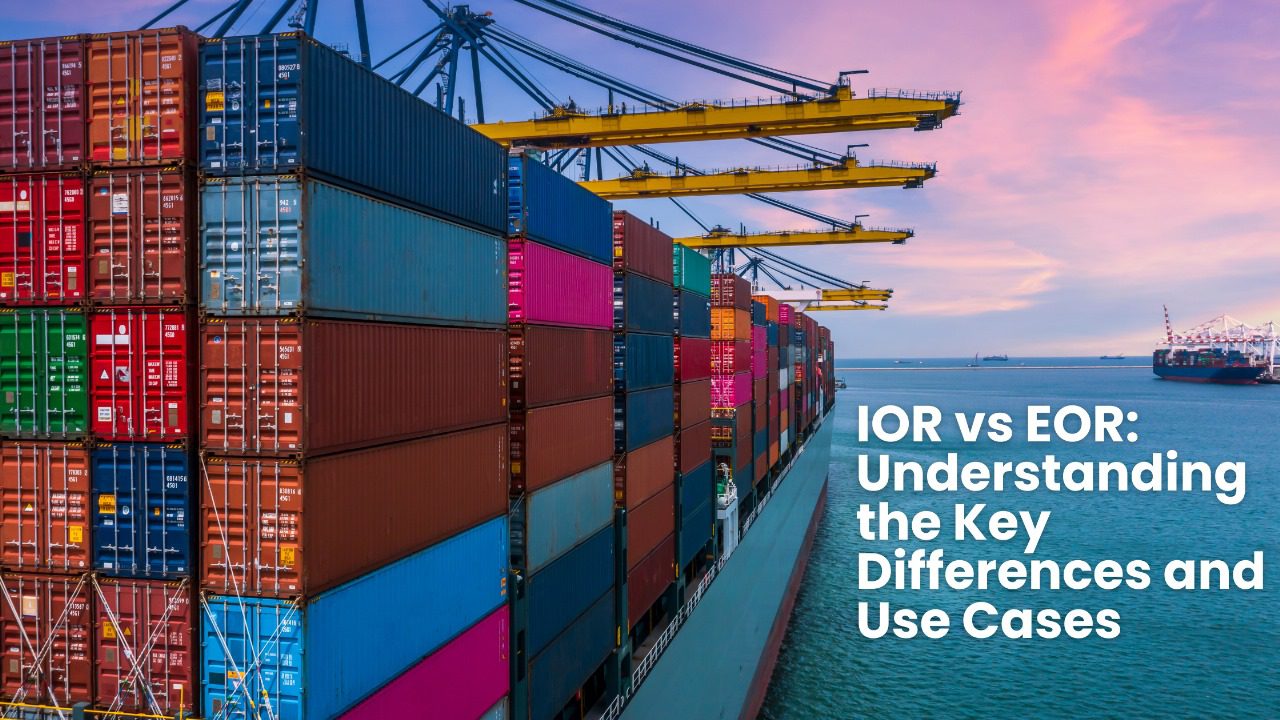
As business operations across the globe are on the rise, two essential compliance services have taken center stage — IOR (Importer of Record) and EOR (Exportof Record). While they almost have similar names, they play entirely different roles. Getting the two mixed up may cause compliance problems, extra expenses, and delays in operations.
In this blog, we’ll clearly explain the differences between IOR and EOR, their unique use cases, and how IOR Solutions can support your global growth with specialized services in each area.
What is an Import of Record (IOR)?
An Importer of Record is the entity that is responsible for making sure the imported goods comply with local law and regulations of the destination country. The IOR has complete responsibility for:
- Customs documentation
- Payment of tax and duty
- Compliance of products (certification, labeling, and safety)
- Organizing freight forwarders and customs brokers
When to Use IOR:
- Exporting IT hardware, electronics, or equipment overseas
- Shipping to nations where your company lacks legal presence
- Cross-border compliance management of SaaS or e-commerce installations
- Enabling customs clearance to be completed smoothly and not face postponements
We at IOR Solutions are the reliable IOR for tech companies, data centers, and exporters seeking entry into more than 150+ countries, including the UAE, Saudi Arabia, Brazil, and many more. We make intricate customs procedures easier and provide 100% compliance.
What is an Export of Record (EOR)?
An Export of Record is a third party that hires Export legally in another person’s name. The EOR is the Export of record and is responsible for:
- Important for Global Trade
- Third-Party EOR Services
- Customs and Compliance
- Legal Exporter Responsibility
When to use EOR:
- No Legal Entity in Exporting Country
- Simplifying Global Expansion
- Handling Complex Export Regulations
- Avoiding Risk of Non-Compliance
When you want to avoid legal penalties, shipment delays, or customs seizures due to incorrect documentation or licenses, using an EOR can help ensure full export compliance.
IOR vs EOR: The Key Differences
Feature |
|
| ||||
Purpose | Compliance for importing goods | Acts as the Legal Exporter | ||||
Responsibility | Customs, duties, product certification International shipping and logistics | Export Compliance, Documentation Handling, Customs Declarations,Product Classification & Valuation | ||||
Legal Role | Acts as the legal importer | Acts as the local export laws and international trade regulations. | ||||
Typical Users | Tech companies, exporters, logistics providers | Foreign Companies Without a Local Entity,E-commerce and Online Retailers,Logistics & Freight Forwarders | ||||
IOR Solutions’ Role | Direct provider of IOR and compliance services | Partnered guidance for EOR needs |
How IOR Solutions Can Help
If your company is growing globally, getting the right service at the right time matters. From shipping servers to a data center in Dubai or deploying IT infrastructure to Europe, we simplify international compliance.
This is what you’ll receive with IOR Solutions:
- End-to-end IOR in 150+ countries
- Simplified customs clearance and paperwork management
- Mastering sensitive technology, networking, and hardware equipment handling
- EOR referrals by choice through our global partner network
- Single point of interface for global expansion — commodities and individuals
Conclusion
In brief, IOR and EOR serve separate but critical roles in global business operations. If you’re importing physical goods internationally, you need an Importer of Record. If you’re employing globally without establishing local offices, you will need an Export of Record.
At IOR Solutions, our aim is to offer speedy, compliant, and reliable IOR solutions — helping companies to export across the globe without risk or delay. For EOR needs, we present you with trusted partners so that you get the right solution for every stage of growth.
Let’s Streamline Your International Growth
Require an IOR service for your next international shipment?Or unsure if you require IOR, EOR, or both?
Contact IOR Solutions today for qualified advice specific to your company.

